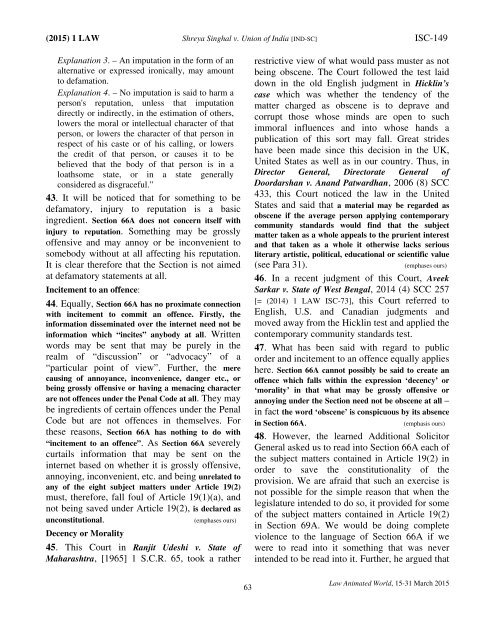Editor: I. Mallikarjuna Sharma Volume 11: 15-31 March 2015 No. 5-6
Martyrs memorial special issue of 15-31 March 2015 paying tributes to Bhagat Singh and other comrades.
Martyrs memorial special issue of 15-31 March 2015 paying tributes to Bhagat Singh and other comrades.
Create successful ePaper yourself
Turn your PDF publications into a flip-book with our unique Google optimized e-Paper software.
(20<strong>15</strong>) 1 LAW Shreya Singhal v. Union of India [IND-SC] ISC-149<br />
Explanation 3. – An imputation in the form of an<br />
alternative or expressed ironically, may amount<br />
to defamation.<br />
Explanation 4. – <strong>No</strong> imputation is said to harm a<br />
person's reputation, unless that imputation<br />
directly or indirectly, in the estimation of others,<br />
lowers the moral or intellectual character of that<br />
person, or lowers the character of that person in<br />
respect of his caste or of his calling, or lowers<br />
the credit of that person, or causes it to be<br />
believed that the body of that person is in a<br />
loathsome state, or in a state generally<br />
considered as disgraceful.”<br />
43. It will be noticed that for something to be<br />
defamatory, injury to reputation is a basic<br />
ingredient. Section 66A does not concern itself with<br />
injury to reputation. Something may be grossly<br />
offensive and may annoy or be inconvenient to<br />
somebody without at all affecting his reputation.<br />
It is clear therefore that the Section is not aimed<br />
at defamatory statements at all.<br />
Incitement to an offence:<br />
44. Equally, Section 66A has no proximate connection<br />
with incitement to commit an offence. Firstly, the<br />
information disseminated over the internet need not be<br />
information which “incites” anybody at all. Written<br />
words may be sent that may be purely in the<br />
realm of “discussion” or “advocacy” of a<br />
“particular point of view”. Further, the mere<br />
causing of annoyance, inconvenience, danger etc., or<br />
being grossly offensive or having a menacing character<br />
are not offences under the Penal Code at all. They may<br />
be ingredients of certain offences under the Penal<br />
Code but are not offences in themselves. For<br />
these reasons, Section 66A has nothing to do with<br />
“incitement to an offence”. As Section 66A severely<br />
curtails information that may be sent on the<br />
internet based on whether it is grossly offensive,<br />
annoying, inconvenient, etc. and being unrelated to<br />
any of the eight subject matters under Article 19(2)<br />
must, therefore, fall foul of Article 19(1)(a), and<br />
not being saved under Article 19(2), is declared as<br />
unconstitutional.<br />
(emphases ours)<br />
Decency or Morality<br />
45. This Court in Ranjit Udeshi v. State of<br />
Maharashtra, [1965] 1 S.C.R. 65, took a rather<br />
restrictive view of what would pass muster as not<br />
being obscene. The Court followed the test laid<br />
down in the old English judgment in Hicklin’s<br />
case which was whether the tendency of the<br />
matter charged as obscene is to deprave and<br />
corrupt those whose minds are open to such<br />
immoral influences and into whose hands a<br />
publication of this sort may fall. Great strides<br />
have been made since this decision in the UK,<br />
United States as well as in our country. Thus, in<br />
Director General, Directorate General of<br />
Doordarshan v. Anand Patwardhan, 2006 (8) SCC<br />
433, this Court noticed the law in the United<br />
States and said that a material may be regarded as<br />
obscene if the average person applying contemporary<br />
community standards would find that the subject<br />
matter taken as a whole appeals to the prurient interest<br />
and that taken as a whole it otherwise lacks serious<br />
literary artistic, political, educational or scientific value<br />
(see Para <strong>31</strong>).<br />
(emphases ours)<br />
46. In a recent judgment of this Court, Aveek<br />
Sarkar v. State of West Bengal, 2014 (4) SCC 257<br />
[= (2014) 1 LAW ISC-73], this Court referred to<br />
English, U.S. and Canadian judgments and<br />
moved away from the Hicklin test and applied the<br />
contemporary community standards test.<br />
47. What has been said with regard to public<br />
order and incitement to an offence equally applies<br />
here. Section 66A cannot possibly be said to create an<br />
offence which falls within the expression ‘decency’ or<br />
‘morality’ in that what may be grossly offensive or<br />
annoying under the Section need not be obscene at all –<br />
in fact the word ‘obscene’ is conspicuous by its absence<br />
in Section 66A.<br />
(emphasis ours)<br />
48. However, the learned Additional Solicitor<br />
General asked us to read into Section 66A each of<br />
the subject matters contained in Article 19(2) in<br />
order to save the constitutionality of the<br />
provision. We are afraid that such an exercise is<br />
not possible for the simple reason that when the<br />
legislature intended to do so, it provided for some<br />
of the subject matters contained in Article 19(2)<br />
in Section 69A. We would be doing complete<br />
violence to the language of Section 66A if we<br />
were to read into it something that was never<br />
intended to be read into it. Further, he argued that<br />
63<br />
Law Animated World, <strong>15</strong>-<strong>31</strong> <strong>March</strong> 20<strong>15</strong>



